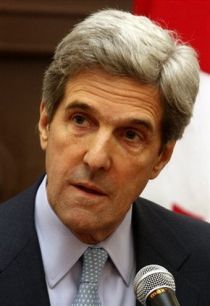US Senator Kerry urges “broad and direct engagement” with Khartoum
April 27, 2009 (WASHINGTON) – Senator John Kerry, a former presidential candidate and chairman of the Senate Foreign Relations Committee, wrote Monday in the Boston Herald that the United States must “begin to redefine the relationship between the United States and Sudan.”

Kerry’s opinion article follows a visit to Khartoum and Darfur in mid-April, where he discussed humanitarian aid with some of President Omer Al-Bashir’s closest aides. He joins the presidential envoy Scott Gration in advancing a policy of rapprochement, taking note that “The violence of 2003 and 2004 has declined substantially, but the consequences of the genocide remain unresolved.”
As reported yesterday by the Sudan Tribune, the US is positioning itself closer to the Government of Sudan, seeing this approach as the best way to improve the situation in Darfur and reach a political settlement, according to a closed briefing given by Special Envoy Scott Gration at the US State Department on April 20, 2009.
Part of this approach involves the implicit promise of diplomatic normalization or actual negotiations to that effect. During 2008, President Bush’s own special envoy tried a similar tack, tying normalization measures to benchmarks in the humanitarian and security situation in Darfur.
Kerry asserted that “The plight of people driven from their homes [in Darfur] remains desperate,” thus proposing to ease the situation “through a sustainable peace accord between Sudan and various rebel groups.”
“The Sudanese government has signalled its willingness to come to the negotiating table,” stated the Senator’s article, published one day after a court in Khartoum sentenced to death 11 rebel prisoners.
He went on to say, “But the rebels need to come together, and they need to come to the table.”
This policy position is reflected by the US Special Envoy, who intends to visit rebel leaders from the Justice and Equality Movement (JEM) and the leader of the Sudan Liberation Movement, Abdel-Wahid Al-Nur, in a bid to pressure them into full-fledged negotiations, which they have thus far spurned since the Abuja process ended in 2006.
Abdel-Wahid, for his part, told Sudan Tribune on April 2 that the new US administration should not “waste their time” on negotiations with Khartoum, while the JEM rebels have made repeated calls for a no-fly zone against the Sudanese air forces, which were involved in major operations against JEM from January to February 2009.
But President Al-Bashir has warmed to the diplomatic cordialities, saying April 13 “Our hands remain held out to those who call for peace and justice in accordance with the standards of fairness and dignity… We even welcome the positive signs sent by U.S. President Barack Obama to the Islamic world on more than one occasion.”
Kerry also voiced support for the United Nations-African Union hybrid peacekeeping operation in Darfur, making an oblique reference to the responsibility of “the global community” to provide the peacekeepers with adequate resources, an issued raised at the US Embassy in Khartoum this month by the Mission’s commander, General Martin Luther Agwai, who appealed for helicopters.
(ST)
